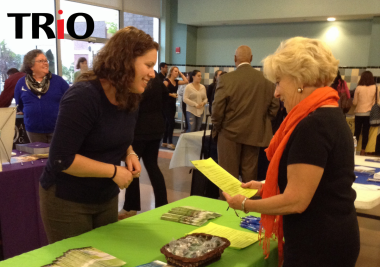
This year, 2014, marks the 50th anniversary of the first Federal TRIO program providing college access and retention programs to address the serious social and cultural barriers to education in America. (Previously only college financing had been on policymakers' radar.) TRIO began as part of President Lyndon B. Johnson's War on Poverty.
TRIO programs, administered by the Student Service area of the Department’s Office of Postsecondary Education, motivate and support students from disadvantaged backgrounds in their pursuit of a college degree. 790,000 low-income, first-generation students and students with disabilities — from sixth grade through college graduation — are served by over 2,800 programs nationally. TRIO programs provide academic tutoring, personal counseling, mentoring, financial guidance, and other supports necessary for educational access and retention. They also provide direct support services for students, and relevant training for directors and staff.
Upward Bound (UB), the first Federal TRIO program, was created under the authority of the Economic Opportunity Act of 1964, as amended. A year later, Talent Search (TS) was created as part of the Higher Education Act of 1965 to assist students applying for newly authorized federal financial aid for postsecondary education. The TRIO name itself was born four years later when the Higher Education Act of 1965 was amended in 1968 to include the Special Services for Disadvantaged Students program – what is now called Student Support Services (SSS). UB, TS and SSS formed a trio of Federal programs designed to foster increased educational opportunity and attainment.
Since 1968, the Trio programs have been expanded to provide a wider range of services. Today, nine programs are included under the TRIO umbrella, seven of which provide direct services to students. The 1972 amendments to the Higher Education Act created Educational Opportunity Centers (EOSs) to help adults select a postsecondary education program and obtain financial aid. Veterans Upward Bound (VUB) was also initiated in 1972 as part of the Upward Bound program to serve returning Vietnam veterans. Amendments in 1986 added the Ronald E. McNair Post-baccalaureate Achievement Program (McNair) to foster doctoral degree attainment by students from underrepresented segments of society. In 1990, the Upward Bound Math and Science (UBMS) program was initiated as part of UB to address the need for specific instruction in the fields of mathematics and science. TRIO also includes a training program for project directors and other TRIO staff (Training Program for Federal TRIO Programs), which was authorized in 1976.
TRIO programs, administered by the Student Service area of the Department’s Office of Postsecondary Education, motivate and support students from disadvantaged backgrounds in their pursuit of a college degree. 790,000 low-income, first-generation students and students with disabilities — from sixth grade through college graduation — are served by over 2,800 programs nationally. TRIO programs provide academic tutoring, personal counseling, mentoring, financial guidance, and other supports necessary for educational access and retention. They also provide direct support services for students, and relevant training for directors and staff.
